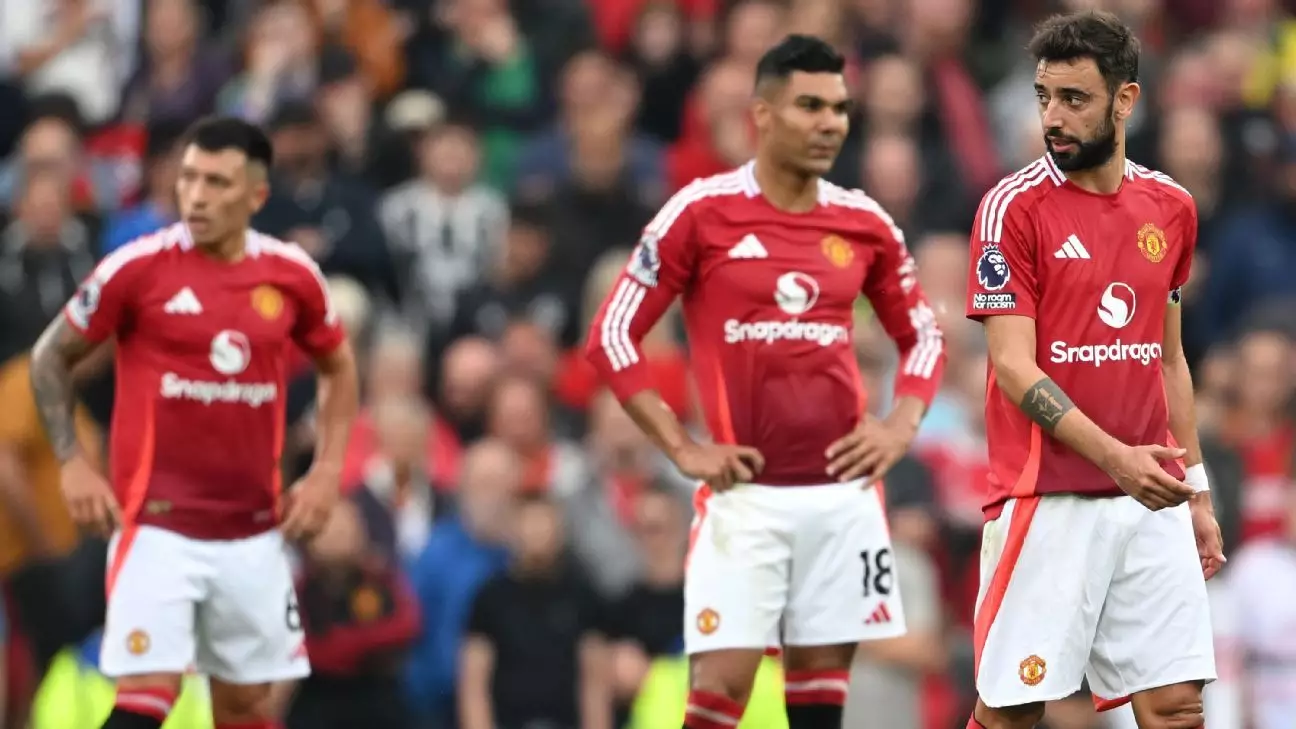Manchester United’s current campaign can only be deemed one of their most alarming beginnings in the history of the Premier League. As they head into the international break positioned disappointingly at 14th in the standings, one can’t help but reflect on the turbulent journey that has brought them here. With only two victories in seven matches, questions surrounding manager Erik ten Hag’s future grow increasingly urgent. This narrative, however, is not only about Ten Hag; it encompasses a series of misjudgments and choices made by the club’s leadership that have collectively led to this precarious moment.
Sir Jim Ratcliffe’s Ineos Group has assumed minority ownership of Manchester United since February, intending to overhaul the footballing side of the organization. Their upcoming board meeting raises the stakes considerably—Ten Hag’s performance is likely to be a focal discussion point. Yet, it is important to consider whether the executives, including Ratcliffe himself, will confront the uncomfortable reality of possibly needing to make a managerial change. The dynamics within the boardroom illustrate a football organization in flux; one that has repeatedly stumbled in its decision-making processes.
Ten Hag’s record is undeniably lackluster, and yet the factors contributing to this poor performance cannot be solely pinned on him. Since taking over, Manchester United has produced their worst league starts in successive seasons. However, what portion of this condition can truly be attributed to the managerial choices, versus broader institutional failings?
United’s deficiencies in recruitment and on-field performance stretch back furthest, deep into the twilight years of Sir Alex Ferguson’s era. While Ten Hag is responsible for the squad’s current state, it is vital to recognize the cumulative nature of the issues. This club has historically overspent on players who have failed to deliver, and although Ten Hag has made questionable signings himself—such as the ineffective Antony for £85 million and injury-prone Mason Mount for £55 million—the structural issues remain.
The decision to pursue Rasmus Højlund as a solution to the club’s goal-scoring crisis has drawn particular criticism. With so many available alternatives—Harry Kane, Victor Osimhen, and Ollie Watkins among them—favoring a younger, less proven talent over established scorers illustrates a misguided strategy. The emphasis seemed to be on future potential rather than immediate impact, a gamble that has left United floundering.
Perhaps one of the most intricate facets of Ten Hag’s management has been his inability to garner the best from key players, notably Marcus Rashford. Having previously orchestrated an impressive return to form in the 2022-2023 season, Rashford now drifts dangerously close to the periphery under Ten Hag’s supervision. The severity of public critiques directed at Rashford, along with an apparent lack of nurturing from Ten Hag, exhibits a gap in effective player management that is essential for any successful team.
Moreover, Ten Hag’s criticisms have lacked constructive intent. By failing to adapt his approach according to the fluctuations in player morale and performance, he has distanced pivotal contributors. The recent pattern of Rashford’s inconsistent play underscores the vulnerability within United’s forward line, and instead of revitalizing this potential, Ten Hag’s management may inadvertently cement stagnation.
Another dimension of concern revolves around Ten Hag’s enduring tactical shortcomings. As a manager renowned for specific tactical philosophies, his rigidity lacks adaptability, rendering his squad predictable and susceptible to counterattack. A staggering 31 matches with two goals conceded showcase a chronic pattern that has existed throughout his tenure. The question that persists is whether his approach aligns with the evolving demands of the Premier League or whether it is woefully out of touch.
The failure to identify and rectify these tactical flaws has compounded United’s defensive vulnerabilities. Discerning observers have noted that reliance on aging defenders, such as Harry Maguire and Jonny Evans, dramatically reduces the team’s capacity to manage high-press situations. Such strategic miscalculations illustrate a broader disconnect between Ten Hag’s theoretical principles and practical execution, suggesting that both managerial and club philosophies may need radical reevaluation.
The specter of uncertainty now looms larger than ever over Old Trafford. Manchester United has a storied legacy of endurance even through challenging times, but it appears that clinging to the hope of a Ferguson-like renaissance at this juncture may be a path to further disappointment. Ratcliffe and his team of executives find themselves at a crucial crossroads; maintaining faith in Ten Hag may risk squeezing United further into disarray.
As the current campaign progresses, key decisions must be made—not just surrounding Ten Hag’s future, but also concerning the broader strategy of the club. It is crucial for Manchester United not merely to seek another temporary fix but to embark on authentic transformation to return to their rightful place among England’s elite football clubs. A commitment to both short-term and long-term strategies that prioritize effective recruitment, strong player relationships, and adaptable tactics will be essential if this storied club hopes to reclaim past glories.

Leave a Reply